Gemini still lags behind ChatGPT on the web, but Google now has four AI apps in the Top 50

The latest Top 100 Gen AI Consumer Apps report from venture capital firm Andreessen Horowitz (a16z) signals a new phase in the AI app market. Google is closing the gap with ChatGPT, while Chinese companies are dominating the mobile space.
Only eleven new apps made it onto the web list since the March 2025 edition, down from seventeen new entries in March. After two and a half years of data, a16z sees signs the AI app market is stabilizing.
On mobile, there are 14 new entries. Analysts say this is partly because app stores are cracking down on "ChatGPT clones." The report ranks the top 50 AI-native web products by monthly unique visits (Similarweb) and the top 50 AI-native mobile apps by monthly active users (Sensor Tower).
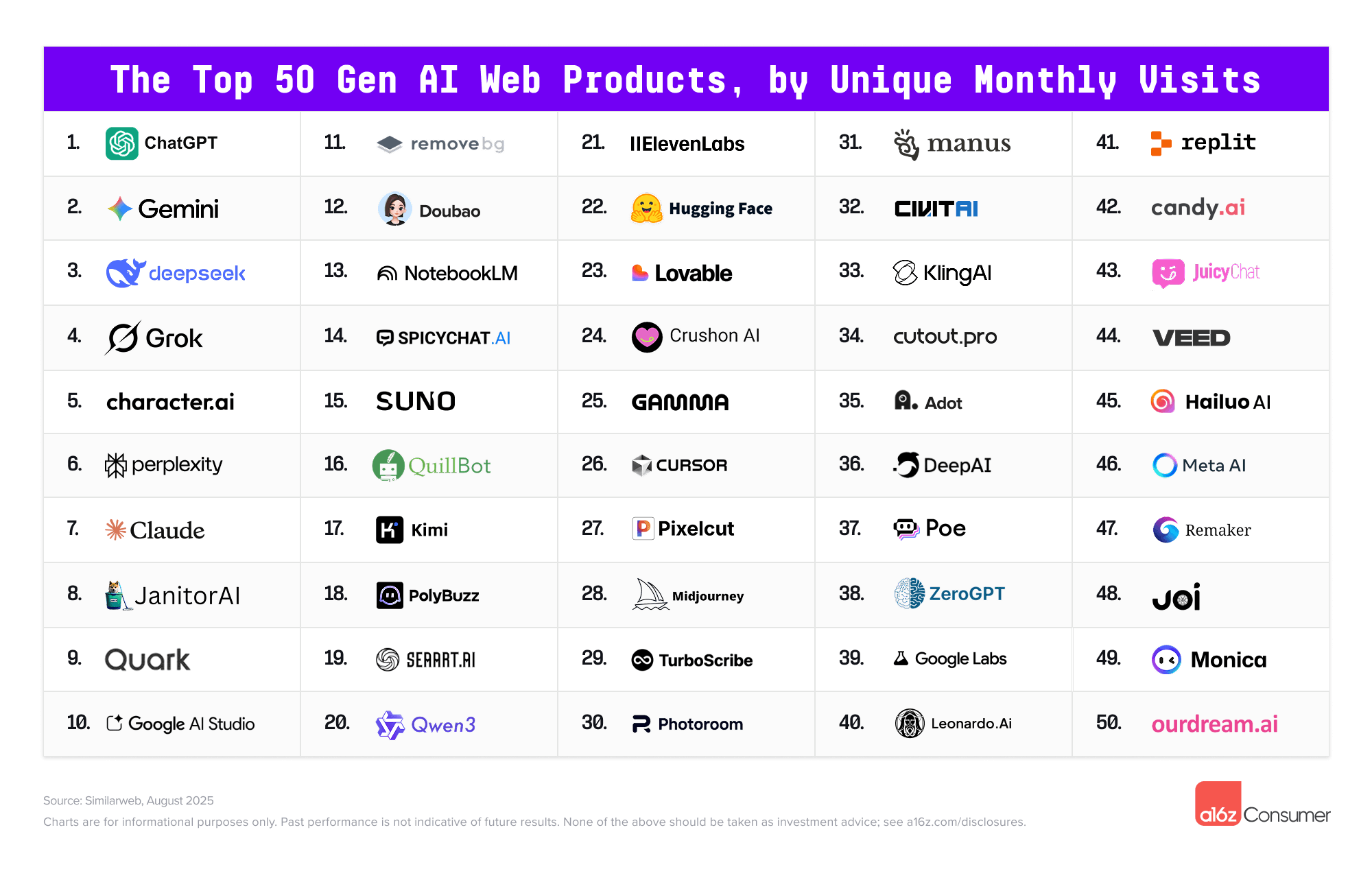
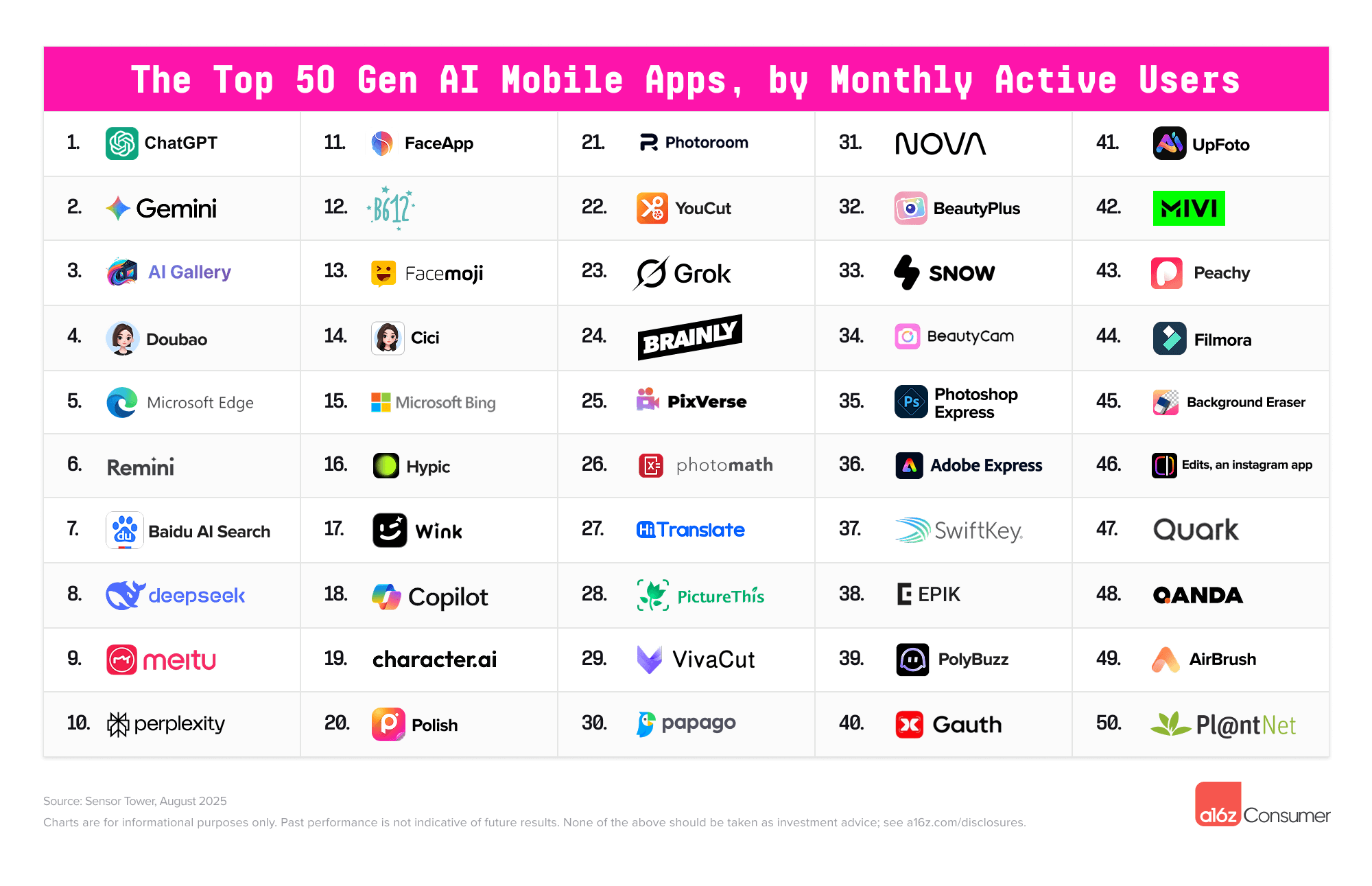
Google's Gemini family closes in on ChatGPT
Google landed four products on the web list for the first time. Gemini now holds second place, pulling in about 12 percent of ChatGPT's web traffic. The gap is even smaller on mobile: Gemini has almost half as many monthly active users as ChatGPT.
Gemini's user base is especially strong on Android, accounting for nearly 90 percent of its users, compared to 60 percent for ChatGPT. Google has a clear home field advantage on Android, where users can launch Gemini just by holding down a button for a few seconds. That doesn't even include Google's AI Overviews or AI Mode, which could also make users less likely to turn to ChatGPT for search.
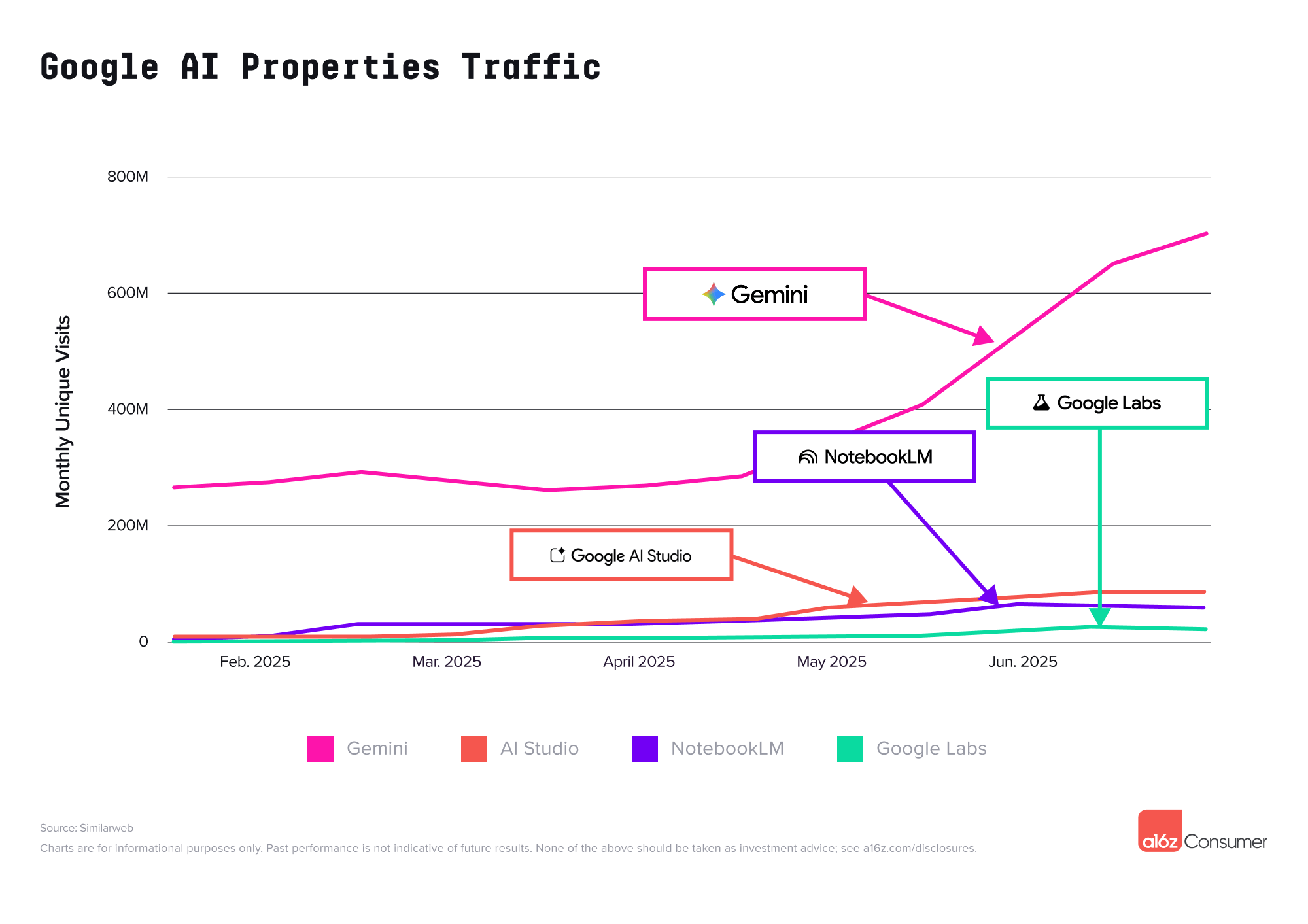
AI Studio, a developer sandbox for Gemini models, broke into the top 10. NotebookLM, a research tool spun off from Google Labs, now ranks 13th. Both tools are much more niche than ChatGPT and mainly appeal to AI enthusiasts. Google Labs, a collection of experimental AI tools, comes in at 39th, boosted by a 13 percent jump in traffic after launching Veo 3 in May 2025.
Grok races to 20 million users
Competition among general-purpose LLM assistants is heating up. ChatGPT is still on top, but Google, Grok, and Meta are gaining ground. X's assistant Grok is now fourth on the web and 23rd on mobile. Grok's mobile app reached over 20 million monthly active users in less than a year.
Grok jumped nearly 40 percent in July 2025 after the release of Grok 4 and the launch of AI companion avatars in its iOS app. Heavy promotion on Elon Musk's X platform is likely fueling growth.
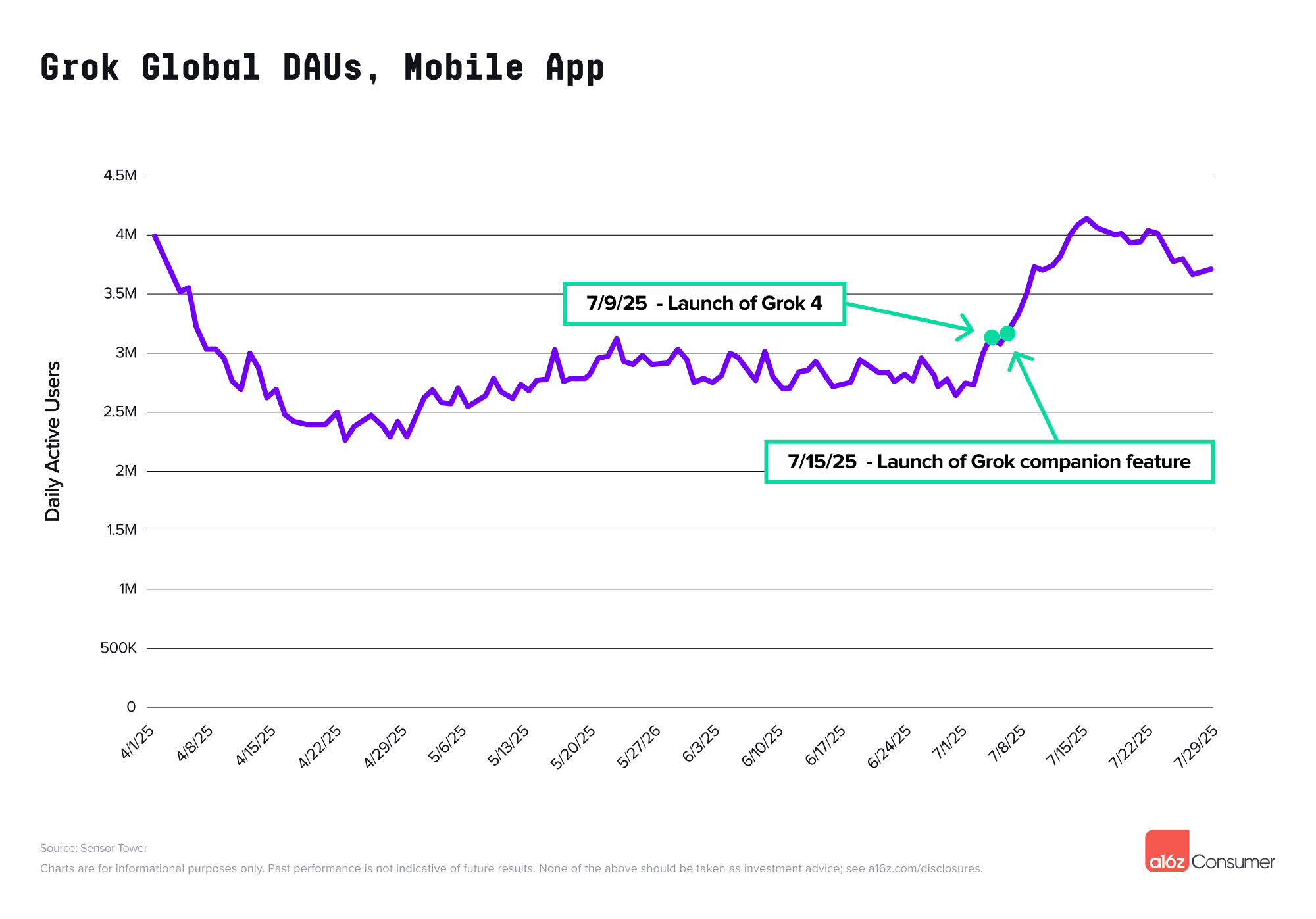
Meta AI is growing more slowly, ranking 46th on the web and missing the mobile list. After a June 2025 incident where user posts appeared in a public feed, growth slowed. Deepseek has lost momentum, down more than 40 percent on the web and 22 percent on mobile since its February peak. Perplexity and Claude, by contrast, continue to grow steadily.
China dominates mobile AI apps
Three Chinese companies are in the web top 20: Quark (Alibaba) at 9th, Doubao (Bytedance) at 12th, and Kimi (Moonshot AI) at 17th. All run Chinese-language sites and get more than 75 percent of their traffic from China.
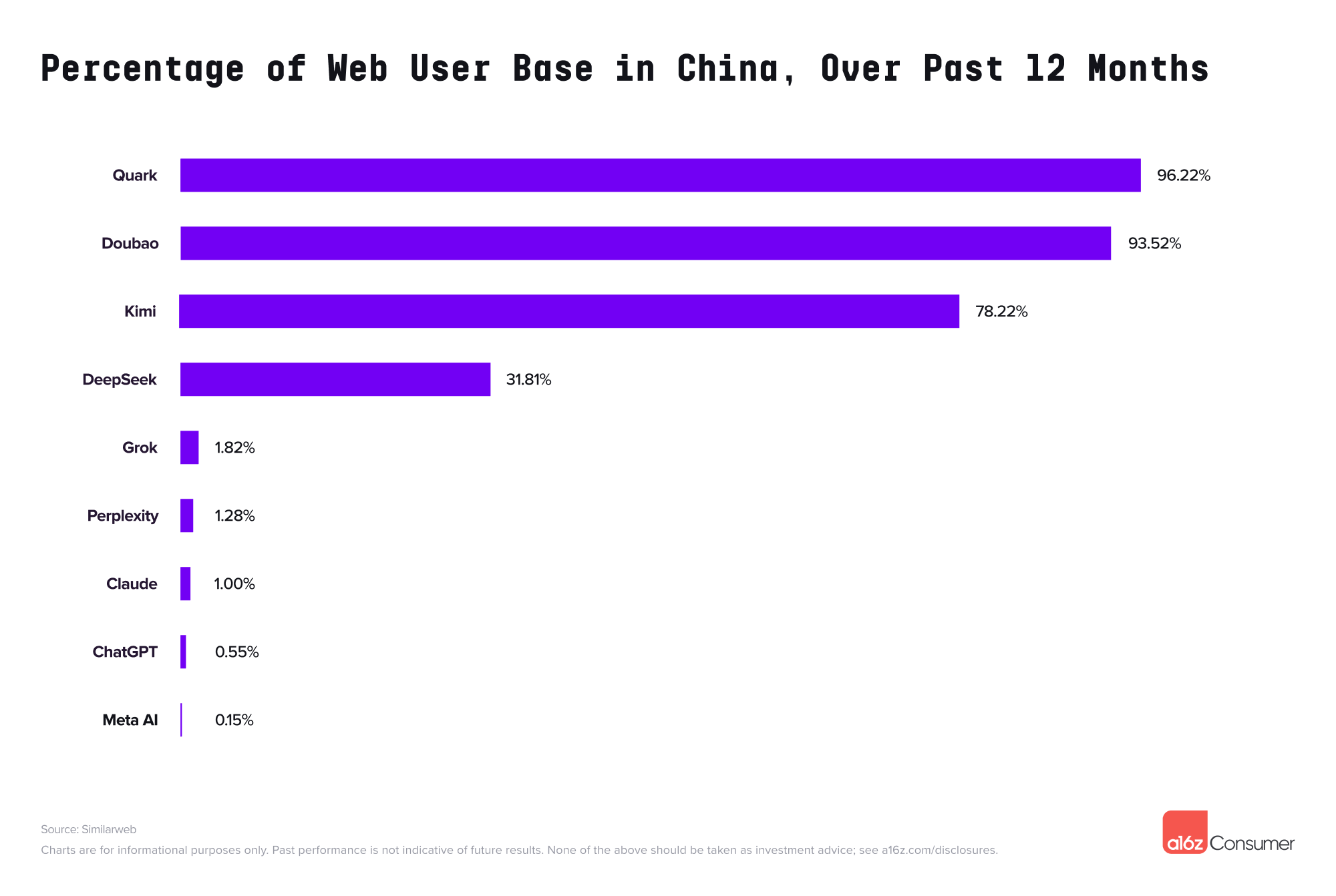
A16z credits this dominance to China's massive user base and restricted access to non-Chinese LLMs like ChatGPT, Perplexity, and Claude. Providers in China must register, store data domestically, and follow censorship and moderation rules.
The trend is even more pronounced on mobile. An estimated 22 of the top 50 apps were developed in China, but only three are primarily used in China. AI company Meitu stands out with five entries in the rankings (Photo & Video Editor, BeautyPlus, BeautyCam, Wink, and Airbrush).
Analysts say Chinese video models have an edge over Western ones, thanks to a larger research pool and fewer IP restrictions. Veo 3 became the first US model to break into these ranks, partly because Google can leverage YouTube data for training.
"Vibe coders" stick around and spend more
In March 2025, only the US-based Bolt.new appeared on the web list in the "vibe coding" category. Now the Swedish startup Lovable is in 22nd place, and Replit is on the main list, while Bolt just missed the cutoff.
Consumer Edge data for a major US vibe coding platform highlights an interesting pattern: user cohorts spend more over time as the most loyal users increase their spending enough to offset churn. Still, many providers have recently raised their prices, which also impacts these numbers.
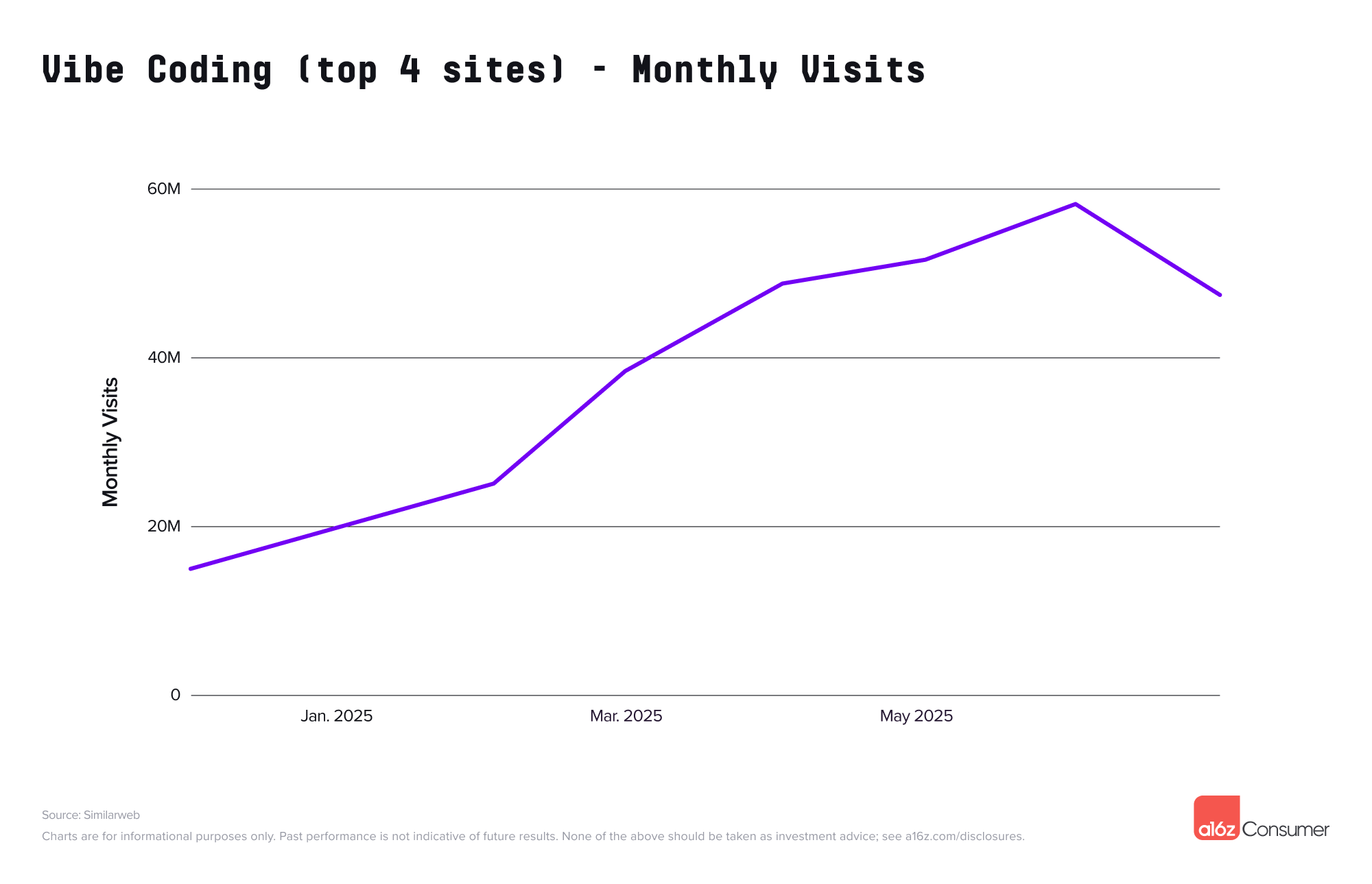
Users create websites with Replit and Lovable, published under the platforms' domains. This traffic isn't included in the rankings. In fact, traffic to lovable.app sites alone would have been enough for a top 50 spot. That could be a win for Lovable—or a sign the overall market is still small.
Other companies in the "vibe coding stack" are benefiting too. Supabase, a database provider closely linked to Bolt and Lovable, is seeing traffic rise alongside these tools.
A recent large-scale survey shows that vibe coding hasn't taken off with professional developers. Seventy-two percent don't use it, and five percent are actively against it.
14 companies have made every list
Fourteen "All Star" companies have appeared in every Web Top 50 list so far. Their apps range from general assistants (ChatGPT, Perplexity, Poe) to AI companions (Character AI), image generation (Midjourney, Leonardo), and productivity tools (Photoroom, Gamma, Quillbot).
Five of the "All Stars" use their own models, seven rely on outside models, and two are aggregators. All come from just five countries (the US, UK, Australia, China, and France), and all but two have taken venture funding. Midjourney is known for being bootstrapped, and Cutout Pro hasn't raised outside capital either.
AI News Without the Hype – Curated by Humans
As a THE DECODER subscriber, you get ad-free reading, our weekly AI newsletter, the exclusive "AI Radar" Frontier Report 6× per year, access to comments, and our complete archive.
Subscribe nowAI news without the hype
Curated by humans.
- Over 20 percent launch discount.
- Read without distractions – no Google ads.
- Access to comments and community discussions.
- Weekly AI newsletter.
- 6 times a year: “AI Radar” – deep dives on key AI topics.
- Up to 25 % off on KI Pro online events.
- Access to our full ten-year archive.
- Get the latest AI news from The Decoder.